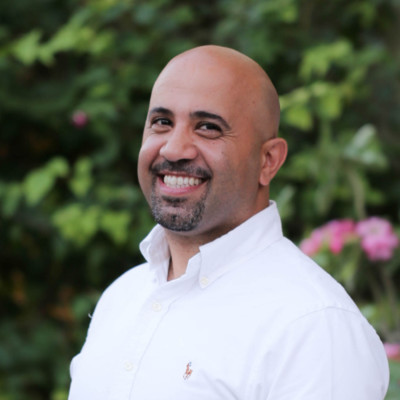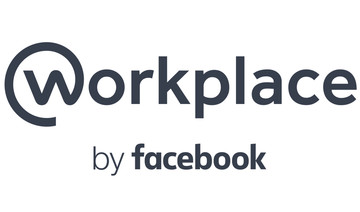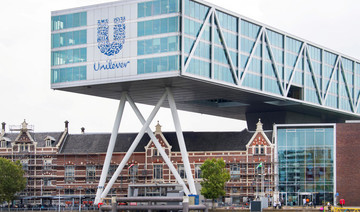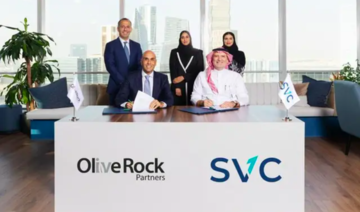LONDON: Major consumer companies including Unilever, Procter & Gamble and Nestle are chasing consumers who want food and household goods delivered automatically, even though this kind of business has not always worked.
The companies are pitching new online subscription services, which promise stable revenues, lower delivery costs and valuable data about customers.
The world’s biggest packaged food company, Nestle, whose Nespresso coffee is already a sizeable subscription business, recently launched a subscription program for nutritional drinks in Japan and expanded ReadyRefresh, an online bottled water service, in the United States.
It also wants to expand the Tails.com subscription pet food from Britain to continental Europe, one of its executives told Reuters. It is testing the service in France for a possible launch this year.
Unilever on Monday will launch its Skinsei brand in the United States after testing, offering “personalized” skincare by subscription. Unilever expanded its Dollar Shave Club subscription razor service to include cologne and beard oil in 2018 and toothpaste in 2017.
Meanwhile, Procter & Gamble, the world’s largest home and personal care company, expanded its Gillette on Demand razor subscription service to Canada. Subscribers can text when they are ready for their next shipment.
Selling directly lets manufacturers skirt retailers, giving them more profit and control over pricing, promotions and merchandising. This helps when retailers such as Amazon and Sainsbury’s are pressing consumer product companies for discounts and pouring resources into own-label products.
Subscription selling gives them guaranteed revenues, a better picture of customers and can make goods cheaper to deliver.
“They’re getting it to you on a specific date, but they don’t have to get it to you in one or two days,” said retail analyst Scott Mushkin at Wolfe Research. “It’s a way for them to manage down their logistics and distribution costs.”
Amazon has offered discounts since 2006 with its Subscribe and Save program, which gives people up to 15 percent off when they sign up for repeat deliveries of household items.
It is now “a multi-billion dollar business inside Amazon,” said Tom Furphy, CEO of venture capital firm Consumer Equity Partners and former vice president of Amazon’s consumables unit, which launched the service.
Liz Cadman, founder of mysubscriptionaddiction.com, said children’s educational boxes were the US website’s hottest category in 2018, followed by grooming, make-up and beauty. Biggest losers were snacks, clothing and pet goods, she said.
The trouble with subscriptions, analysts say, is high cancelation rates as consumers get bored, high marketing costs, costly delivery and the fact that people often end up with goods they don’t want.
Mondelez International has suspended its Oreo Cookie Club, a program rolled out last year. For $20 per month, subscribers got a box containing Oreos in different flavours, with recipe cards, candy and merchandise such as Oreo-branded socks, sunglasses or cups.
After three months, Ruby Scarbrough canceled her subscription, saying in an online review that she could buy the cookies more cheaply at a store.
Jeff Jarrett, global head of e-commerce at Mondelez, pointed to the challenges of delivering mass-market snacks economically and keeping customers interested.
Nobody has “cracked the code” for snack subscriptions, he said, though Mondelez may give its Oreo club another shot, likely with more flavours, better merchandise or a better online experience.
General Mills axed its Nibblr subscription snack business in 2015 after 18 months. A similar project from Kellogg, reportedly planned for that year, never materialized. Walmart shut its Goodies subscription snack business in 2013 after a year.
While subscriptions delight some consumers, they frustrate others because “you end up with too much of the product or too little,” Procter & Gamble CFO Jon Moeller told Reuters.
Subscriptions represent about 10 percent of all US online sales, and more than 1 percent of all retail sales, said Burt Flickinger, managing director of consumer consulting firm Strategic Resources Group.
He said subscriptions are the hottest part of the industry, growing more than 17 percent a year and outpacing overall online sales, which are growing more than 12 percent. He said subscriptions may exceed 10 percent of the US retail market in five years and 15 percent in 10 years.
Euromonitor International says subscription shaving clubs, including Dollar Shave and Harry’s, took about 12 percent of the $2.1 billion US market for men’s razors and blades in 2017, up from 6.4 percent two years earlier. But Dollar Shave’s sales have slowed dramatically, with Unilever in October citing growth of around 10 percent year-to-date, compared to more than 50 percent in 2016, the year it bought the brand.
Unilever said a slowdown was not unusual but it was “pleased with performance” at Dollar Shave, whose North American business would be close to breakeven this year.
Unilever’s global brand vice president of skincare, Valentina Ciobanu, told Reuters the company wants to make its subscriptions more flexible, because consumers demand options when they buy.
“We don’t force you to subscribe at the beginning,” Ciobanu said about the Skinsei brand, which she created inside the company. Skinsei aimed to keep shoppers loyal in part by making changes to the products it recommends based on the season of the year and other factors, she said.
Ciobanu said Skinsei’s products could be combined into more than one million skincare regimens. She declined to give sales projections.
However, she and other executives said it was unclear whether subscription brands would take off or remain niche.
“For now it’s still early adopters. The question mark is how long will it take to become more mass, and I think nobody has the answer to that question,” said Bernard Meunier, who runs Nestle’s Purina Petcare business in Europe, Middle East and North Africa.
Global consumer giants like Unilever, Nestle spurn risks to chase online subscribers
Global consumer giants like Unilever, Nestle spurn risks to chase online subscribers

- The companies are pitching new online subscription services, which promise stable revenues, lower delivery costs and valuable data about customers
- Subscription selling gives them guaranteed revenues, a better picture of customers and can make goods cheaper to deliver
Meituan looks to hire in Saudi Arabia, indicating food delivery expansion

SHANGHAI: Chinese food delivery giant Meituan is seeking to hire staff for at least eight positions based in Riyadh, in a sign it may be looking to Saudi Arabia to further its global expansion ambitions, according to Reuters.
The jobs ads, which is hiring for KeeTa, the brand name Meituan uses for its food delivery operations in Hong Kong, is seeking candidates with expertise in business development, user acquisition, and customer retention, according to posts seen by Reuters on Linkedin and on Middle Eastern jobs site Bayt.com.
Meituan did not immediately respond to a request for comment by Reuters on its plans for Saudi expansion.
Bloomberg reported earlier on Friday that the Beijing-based firm would make its Middle East debut with Riyadh as the first stop.
Since expanding to Hong Kong in May 2023, Meituan’s first foray outside of mainland China, speculation has persisted that its overseas march would continue as the firm searches for growth opportunities, with the Middle East rumored since last year to be one area of possible expansion.
“We are actively evaluating opportunities in other markets,“ Meituan CEO Wang Xing said during a post-earnings call with analysts last month.
“We have the tech know-how and operational know-how, so we are quietly confident we can enter a new market and find an approach that works for consumers there.”
IMF opens first MENA office in Riyadh

RIYADH: The International Monetary Fund has opened its first office the Middle East and North Africa region in Riyadh.
The office was launched during the Joint Regional Conference on Industrial Policy for Diversification, jointly organized by the IMF and the Ministry of Finance, on April 24.
The new office aims to strengthen capacity building, regional surveillance, and outreach to foster stability, growth, and regional integration, thereby promoting partnerships in the Middle East and beyond, according to the Saudi Press Agency.
Additionally, the office will facilitate closer collaboration between the IMF and regional institutions, governments, and other stakeholders, the SPA report noted, adding that the IMF expressed its appreciation to Saudi Arabia for its financial contribution aimed at enhancing capacity development in its member countries, including fragile states.
Abdoul Aziz Wane, a seasoned IMF director with an extensive understanding of the institution and a broad network of policymakers and academics worldwide, will serve as the first director of the Riyadh office.
Saudi minister to deliver keynote speech at Automechanika Riyadh conference

RIYADH: Saudi Arabia’s Deputy Minister of Investment Transaction Saleh Al-Khabti is set to deliver the keynote speech at a global automotive aftermarket industry conference in Riyadh.
Set to be held from April 30 April to May 2 in the Saudi capital’s International Convention and Exhibition Center, Automechanika Riyadh will welcome more than 340 exhibitors from over 25 countries.
Al-Khabti will make the marquee address on the first day of the event, which will also see participation from Aftab Ahmed, chief advisor for the Automotive Cluster at the National Industrial Development Centre, Ministry of Industry and Mineral Resources.
Saudi Arabia’s automotive sector is undergoing a transformation, with the Kingdom’s Public Investment Fund becoming the major shareholder in US-based electric vehicle manufacturer Lucid, and also striking a deal with Hyundai to collaborate on the construction of a $500 million-manufacturing facility.
Alongside this, Saudi Arabia’s Crown Prince Mohammed bin Salman launched the Kingdom’s first electric vehicle brand in November 2022.
Commenting on the upcoming trade show, Bilal Al-Barmawi, CEO and founder of 1st Arabia Trade Shows & Conferences, said: “It is a great honor for Automechanika Riyadh to be held under the patronage of the Saudi Arabian Ministry of Investment, and we’re grateful for their continued support as the event goes from strength-to-strength.
“The insights and support we’ve already received have been invaluable, and we look forward to continuing this relationship throughout the event and beyond.”
This edition of Automechanika Riyadh will feature seven product focus areas, including parts and components, tyres and batteries, and oils and lubricants.
Accessories and customizing, diagnostics and repairs, and body and paint will also be discussed, as well as care and wash.
Aly Hefny, show manager for Automechanika Riyadh, Messe Frankfurt Middle East, said: “The caliber of speakers confirmed to take part at Automechanika Riyadh is a testament to the event’s growth and prominence within the regional automotive market.
“We have developed a show that goes beyond the norm by providing a platform that supports knowledge sharing and networking while promoting the opportunity to engage with key industry experts and hear the latest developments, trends and innovations changing the dynamics of the automotive sector.”
Aramco-backed S-Oil expects Q2 refining margins to remain steady then trend upward

SEOUL: South Korea’s S-Oil forecast on Friday that second-quarter refining margins will be steady, supported by regular maintenance in the region, then trend upward in tandem with higher demand as the summer season gets underway, according to Reuters.
Over the January-March period, the refiner said it operated the crude distillation units at its 669,000-barrel-per-day oil refinery in the southeastern city of Ulsan at 91.9 percent of capacity, compared with 94 percent in October-December.
S-Oil, whose main shareholder is Saudi Aramco, plans to shut its No. 1 crude distillation unit sometime this year for maintenance, the company said in an earnings presentation, without specifying the time.
Venture investments spark renaissance of Saudi innovation

RIYADH: In Saudi Arabia, a dynamic transformation is unfolding within the entrepreneurial landscape, powered by the robust growth of venture capital, which achieved an impressive 86 percent compound annual growth rate from 2019 to 2023.
This financial infusion has been a game-changer, propelling the Kingdom past the $1 billion mark in venture capital investment last year and igniting a wave of innovative thinking among Saudi entrepreneurs.
Simply put, VC is a category of private market investment and financing. A VC firm raises capital from investors, referred to as Limited Partners, and uses that capital to fund promising startups they have determined as likely to have high growth potential in an emerging category.
A vibrant scene
“The rise of venture capital in Saudi Arabia is fueling a vibrant entrepreneurial scene,” said the founder of Saudi-based VC firm Nama Ventures.
Offering a unique perspective on this financial phenomenon, Mohammed Al-Zubi shared his insights with Arab News about how venture capital is energizing the entrepreneurial scene in the Kingdom.
Al-Zubi described this financial influx as a vital nutrient, fostering a fertile ground for innovation and growth within the Kingdom.

Ripple effects
“Startups get crucial funding, expert guidance, and exit pathways, attracting and retaining ambitious talent. This creates a ripple effect — successful ventures generate high-quality jobs, attracting more skilled professionals and expertise,” Al-Zubi told Arab News.
However, he explained that challenges like limited seed funding and skill mismatch require more attention.
“By fostering a diverse ecosystem and addressing these gaps, Saudi Arabia can harness the power of VC to build a thriving and sustainable entrepreneurial powerhouse,” Al-Zubi added.
Echoing Al-Zubi’s remarks, Tariq bin Hendi, senior partner at Global Ventures, told Arab News that the Kingdom’s VC growth reflects its booming economy.
“Saudi Arabia is a large market with compelling macroeconomics and significant funding, which in turn is re-shaping the regional startup landscape,” Hendi said.
“Increased investment has helped start-ups to digitize, scale and accelerate their business operations — with many success stories: Tarabut, Zension, RedSea, Zid and Hakbah being among the most well-known,” Hendi added.
An innovative economy
Hendi emphasizes the crucial role of venture capital in the economic diversification of Saudi Arabia.
He notes that sectors like agritech, fintech, and cleantech are attracting significant investments, aligning with Saudi Arabia’s Vision 2030 goals.
“The increase in investment saw Saudi Arabia secure MENA’s (Middle East and North Africa) highest VC funding in 2023, which is also aligned with the country’s Vision 2030 objectives,” he stated
“Venture capital’s investment in nascent technologies and innovative ventures allows for early-stage experimentation and for new start-ups to respond to analogue-based problems previously difficult to navigate through digitalization,” Hendi added.
According to him, this synergy between venture capital and startups not only drives technological progress but also offers insights into the regulatory landscape, promoting economic diversity and innovation within the region.
He also highlights the broader impact of venture capital, noting how it enables local businesses to scale and address global challenges, creating job opportunities and demonstrating the Kingdom’s potential in leading sustainable startup growth.
Moreover, Hendi points out that venture capital stimulates international collaboration, attracting global investors and reducing investment risks, further bolstering Saudi Arabia’s position as a dynamic hub for economic activity and innovation.

Furthermore, in his article “Venture Capital Fundamentals: Why VC Is A Driving Force Of Innovation,” Mark Flickinger, general partner and chief operating officer at US-based BIP Ventures, describes VC as a critical factor for economic innovation.
“VC is a rewarding form of private market investment that gives innovators a real chance to transform their ideas into businesses. It connects founders and investors, driving progress and successful outcomes for both,” Flickinger said.
“And for everyone who is part of this virtuous cycle of funding, building, and scaling market-changing businesses, VC is a way to support the impact of the innovation economy – which is the economy today,” he added.
The challenge
Hendi underscores the significant transformation underway in Saudi Arabia, driven by the nation’s economic diversification and digitalization, which is fueling a burgeoning demand for talent and innovation.
With a young, tech-savvy population, the Kingdom is ripe for entrepreneurial ventures, evidenced by success stories like Tabby, he explained.
The growing ecosystem, supported by incubators and successful exits, showcases the country’s potential as a hotbed for technology-driven businesses catering to consumers, enterprises, and government sectors.
The challenge now, according to him, is to further enhance this vibrant environment, making Saudi Arabia even more appealing for entrepreneurs.
He advocates for continued deregulation and the creation of conditions that encourage innovation, enabling entrepreneurs to develop products and services that resonate with consumers and drive economic growth.
The goal is to not only maintain the momentum but to elevate Saudi Arabia’s status as a premier destination for starting and scaling innovative ventures.
How to utilize funding
As VC growth continues to expand, startups are pressured to find efficient ways to use their funding to boost the overall ecosystem.
Al-Zubi shares his advice stating: “Imagine your funding as rocket fuel – you have to blast off without burning it all at once, right?”
“To fly long and far, focus on essentials. Build a stellar team, fuel growth with customer love, and lay a strong financial groundwork,” Al-Zubi added.
“Track your rocket’s path with data, experiment with new maneuvers, and stay tuned to the space weather. Be open with your investors, listen to wise advisors, and don’t be afraid to adjust your trajectory if the wind changes. Remember, long-term success is a marathon, not a sprint. Spend smart, learn fast, and keep your eyes on the stars,” he added.
Furthermore, Hendi advocates for meticulous planning in resource allocation, emphasizing the importance of understanding the market, timing for product launches, and strategic deployment of capital.
According to Hendi, startups must have a clear grasp of their financial roadmap, with a detailed understanding of expected expenditures over set timelines, to ensure sustained growth and success in the evolving economic environment.
















